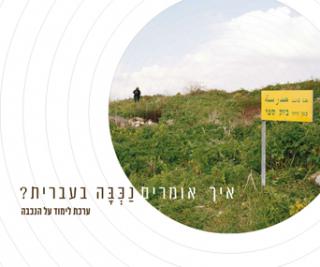On 14 April 2013, Anat Brot, my instructor at the Kibbutzim College, suggested that I teach a class about the Nakba prior to the commemoration of Nakba Day on May 15. I was very pleased at her request and agreed without hesitation. I felt that I really needed her suggestion, particularly at the present time. I thought it was an excellent opportunity to explain to my fellow-students what I thought and felt about Independence Day.
I told my family and friends; they were all shocked and didn’t believe me. It was a big surprise for them and, I admit, for me. We didn’t expect that an academic institution in Tel Aviv would want to address the fraught topic of the Nakba. No member of my family had yet been required to deal with the complexities of explaining the Nakba to Israelis. We didn’t know whether they’d understand that the day on which they were celebrating was for us a day of mourning. Instead of celebrating we march and demonstrate!
I confronted many dilemmas while preparing the lecture. Will my class affect my relations with the other students, who are all Jewish? How should I organize my lecture? How far should I go? Will what I have to say affect what they think? I shared my concerns with Anat, who continued to support and encourage me.
The topic is fraught and involves at least two narratives: the one that’s widespread in Israel and ignores the Nakba, and the narrative that sees it as a major, important disaster. I decided to base my discussion of the Nakba only on Jewish, Israeli sources – primarily the new historians like Ilan Pappe, Benny Morris, etc. I also used internet sites, periodicals and made extensive use of Zochrot’s web site. I did so to make my presentation more credible. I thought in this way to show my Jewish classmates that the Nakba isn’t “just a Palestinian narrative,” but is also recognized by Israeli researchers.
This was my first experience speaking to Jewish students about the Nakba, and even though I’ve known my classmates for two years I was anxious about the lecture. I was apprehensive about their reactions, about how they’d respond to a different narrative. It was important to me to maintain good relations with them, and I was afraid that the lecture would hurt them.
My family, friends and supervisor told me in advance that because of the sensitive nature of the topic the students would try to trip me up with questions and argue with me during my presentation. They also mentioned the possibility that my lecture would harm our personal relationships. Still, they all encouraged me and helped me prepare.
It was important to me to present the topic in a straightforward manner, not provocatively. I organized the lecture as follows:
I opened by reading “Write down: I am an Arab!”, the poem by Mahmoud Darwish, in two languages. The class was completely quiet when I finished; no one said a word. The silence made me even more nervous and apprehensive.
I next showed a presentation that described the situation in Palestine in 1947. I discussed the cities, culture, the economy, land, the number of inhabitants, compared to the situation immediately after the establishment of the state. I didn’t include my own personal, subjective aspect. It was an academic lecture based on Israeli sources. The silence continued after the presentation ended.
Then we had a discussion. It was immediately apparent how ignorant some students were about the history of the Nakba. An incisive, pointed debate began among the students themselves, focusing primarily on that ignorance. They asked why they didn’t know any of this? Why hadn’t they been taught the true history? How can the injustice be remedied? What is the best way to teach it in schools? Most didn’t know about the new historians and about research in Hebrew on the Nakba. I referred to Zochrot’s web site as an important source of information and wrote its URL on the board. Some had heard of Zochrot; others wanted to learn more about the organization. They were particularly interested in Benny Morris’ book, 1948.
At the end of class many of my fellow students came to thank me for the lecture and for what they’d learned, and asked me to recommend additional research sources. I also received many compliments from my family. They were very glad about what I did, were proud that I successfully presented to Israelis a subject that is so important to us as Palestinians.
I’m very happy I enrolled in the Kibbutz Teachers Seminary, which allows total freedom of expression. I was also lucky to have an encouraging, supportive and right supervisor. I’m grateful, because I wouldn’t have attempted this without her.
I’m grateful to Zochrot for suggesting I write this for publication. I was unsure whether I should sign my full name. I decided to do so, not without some apprehension, to contribute to the teaching of the Nakba and serve as an example so that others will also express their opinions on the topic, sensitive as it may be. I’m sure it will be important to the discussion of the Palestinian-Israeli conflict.
Join our efforts to expose the truth
Join UsRelated Keywords
Resist the ongoing Nakba
Help us resist the ongoing Nakba
Donate NowJoin our efforts in exposing the truth about the ongoing Nakba and in promoting acknowledgement and responsibility for the injustices of the Nakba, support for the right of return and a commitment to building a just society for all in Palestine.



